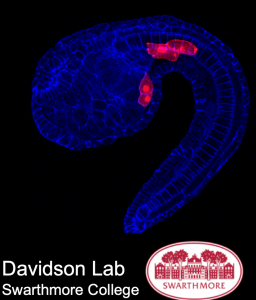NSF funded post-doctoral position focused on the interplay between cell division and signaling (Davidson lab, Swarthmore College)
Posted by Bradley Justin Davidson, on 20 May 2021
Job type: Post-doc
Location: Swarthmore College
Closing Date: 31 December 2021
Searching for a post-doc who is passionate about both teaching and research. Research in the Davidson lab focuses on the interplay between division and inductive signaling. In particular, we are exploring how signaling receptors are trafficked in dividing cells to generate asymmetric induction of a cardiac progenitor lineage. We study these questions in the invertebrate chordate, Ciona robusta. Ciona embryos consist of extremely low cell numbers allowing high resolution analysis of intra-cellular dynamics in intact embryos. The ease of generating transgenic Ciona embryos make this an excellent model organism for undergraduate research. This position is funded through a collaborative grant that includes my former post-doc Christina Cota who is now an Assistant Professor at Colby College along with Prof. Danelle Devenport at Princeton who is investigating receptor trafficking in cultured mouse epithelial cells. This is a great opportunity for a post-doc with an interest in undergraduate teaching and research. It’s clear that Christina’s strong research record along with her demonstrated commitment to undergraduate mentoring and teaching made her a strong candidate for this very competitive career track.

To apply or if you have questions about the position – please send your CV and a cover letter describing your interest to Bradley Davidson at bdavids1@swarthmore.edu. I will be in touch with instructions for submitting a formal application.
Proposed start date: This summer.
Salary: Standard Post-doc salary in line with experience
Start date: 20 May 2021
Closing Date: 31 December 2021
Scientific fields: Cell biology, Signalling, Cell fate control and differentiation, Evo-devo and eco-evo-devo
Model systems: Other invertebrate
Duration: Fixed term
Minimum qualifications: Applicants should have a PhD (or be close to completing one) in a relevant subject area. Excellent communication skills and a commitment to undergraduate mentoring are essential. Ideally, candidates would also have extensive experience with confocal microscopy or image analysis.

